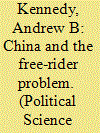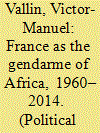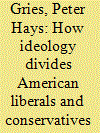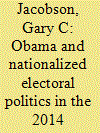|
|
|
Sort Order |
|
|
|
Items / Page
|
|
|
|
|
|
|
| Srl | Item |
| 1 |
ID:
137798


|
|
|
|
|
| Summary/Abstract |
IS CHINA PULLING ITS WEIGHT IN THE INTERNATIONAL SYSTEM? In recent years, China has increased its contribution to United Nations peacekeeping, raised its foreign aid to impoverished countries, and made significant commitments to global arms control initiatives.1 Even so, a rising chorus of voices has charged that China is “free riding” on cooperation undertaken by the United States and other countries that provides benefits to the wider international community. Calling China a free rider is nothing new; scholars described China as free riding on nuclear arms control agreements and international environmental cooperation as early as the 1990s.2 Yet with the United States beset by financial and economic woes in recent years, allegations that Beijing free rides on the United States and other countries have grown more frequent and more impatient. Whether the issue is fighting terrorism or preventing nuclear proliferation, it has become routine—particularly in the United States—to complain that China is not doing enough to support international cooperation.3 The number of articles containing both of the terms “China” and “free rider” in the Factiva database, for example, increased from an average of 39 per year from 2005 to 2009 to 75 per year from 2010 to 2013. Chinese observers, meanwhile, argue among themselves whether China free rides (da bian che) on the collective action of other states.4 Some agree that China should be seen as a free rider, at least in some areas.5 Other Chinese writers disagree and reject the notion that China should take on “even more responsibility” for global governance.
|
|
|
|
|
|
|
|
|
|
|
|
|
|
|
|
| 2 |
ID:
137800


|
|
|
|
|
| Summary/Abstract |
THE EMERGENCE OF FRANCE AS THE GENDARME OF AFRICA goes back to the 1960s and the independence of its African colonies. Unlike other European colonial powers, such as the United Kingdom, France was faced late with decolonization and, most of all, wished to maintain an exclusive influence over its former colonial empire. French West Africa and French Equatorial Africa disappeared, but France sought to maintain privileged and lasting political, cultural, economic, and military relations with the former colonies. The new African regimes would receive military and technical assistance from France in return for backing its international policies. Paris thus established a type of nested neocolonial association with these sub-Saharan states of limited sovereignty. This defined France's pré carré in Africa, its area of exclusive action.
|
|
|
|
|
|
|
|
|
|
|
|
|
|
|
|
| 3 |
ID:
137799


|
|
|
|
|
| Summary/Abstract |
IN A SERIES OF ARTICLES AND A BOOK ON THE ISRAEL LOBBY, realist international relations theorists John Mearsheimer and Stephen Walt argued in 2006–2007 that America's virtually unqualified support for Israel was damaging the U.S. national interest. “Now that the Cold War is over, Israel has become a strategic liability for the United States,” they argue. “Washington's close relationship with Jerusalem makes it harder, not easier, to defeat the terrorists who are now targeting the United States.”1 America's disastrous Middle East policy, they further contend, is best explained by the pernicious influence of the “Israel lobby” in Washington, especially wealthy Jews and the right-wing American Israel Public Affairs Committee (AIPAC).
|
|
|
|
|
|
|
|
|
|
|
|
|
|
|
|
| 4 |
ID:
137797


|
|
|
|
|
| Summary/Abstract |
Analyzes the 2014 midterm congressional elections. He finds that, in aggregate, the electorate treated the midterm as a referendum on the economy and particularly Barack Obama’s presidency, producing the most partisan, nationalized, and president-centered midterm election in at least 60 years.
|
|
|
|
|
|
|
|
|
|
|
|
|
|
|
|
| 5 |
ID:
137801


|
|
|
|
|
| Summary/Abstract |
CIVIL-MILITARY RELATIONS IN TURKEY TOOK an exceptional turn in 2007 with the start of an investigation, known to the public as Ergenekon, that implicated military officers in coup plots. The inquisition can be traced back to March 2007, when the alleged diaries of a former commander of the navy published by a weekly magazine exposed plans of a military intervention against the Justice and Development Party (Adalet ve Kalkınma Partisi, AKP) government in 2003–2004. In the subsequent years, other plots were revealed. Among them the Sledgehammer investigation started as a separate inquisition in January 2010, and 325 suspects, including the former first army commander and former commanders of the air force and navy, were found guilty and received prison sentences in September 2012. In June 2014, the Constitutional Court overturned this decision and all of the accused were released from prison. Although arguably the Sledgehammer plot and other court cases also had a significant impact on public views regarding the Turkish armed forces, this article focuses only on the consequences of the Ergenekon case between 2007 and 2012.
|
|
|
|
|
|
|
|
|
|
|
|
|
|
|
|
|
|
|
|
|